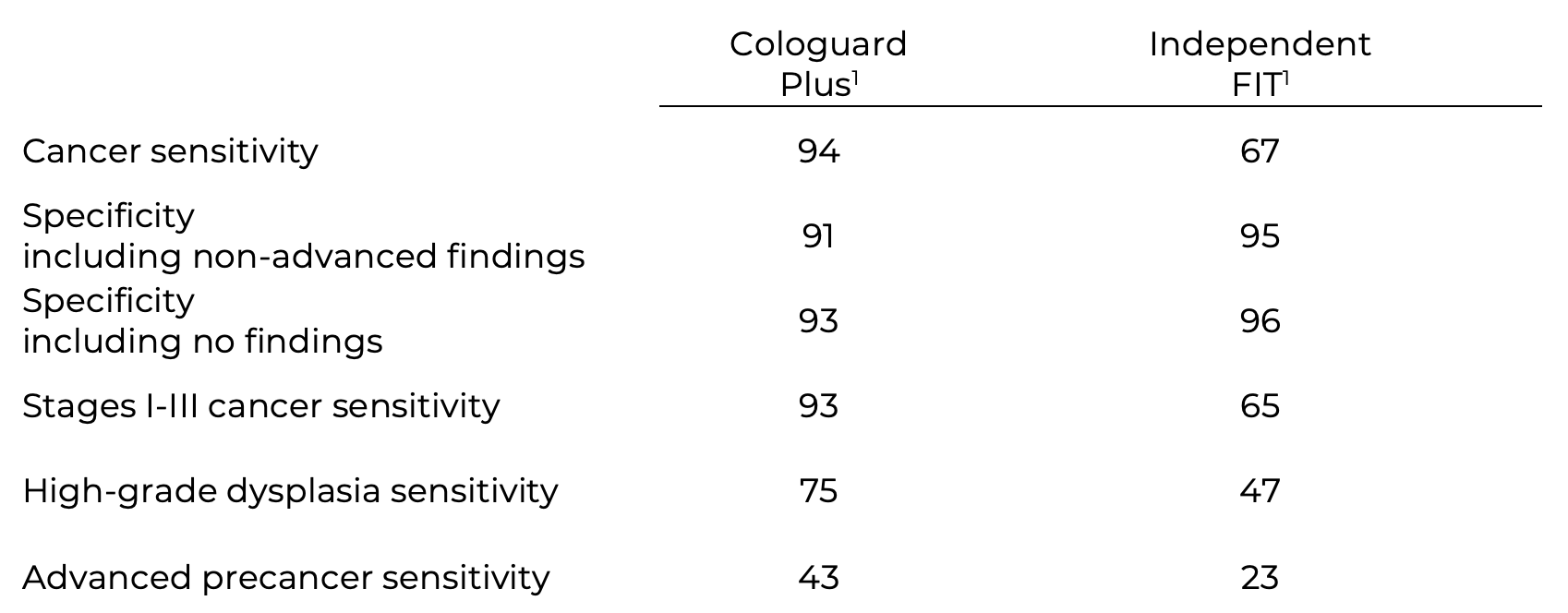Cologuard Plus is only noninvasive test to be evaluated head-to-head against an independent fecal immunochemical test, which it significantly outperformed
20,000-participant BLUE-C study included 98 colorectal cancers and reflects racial and ethnic diversity of U.S.
Company will host conference call and webcast at 8:00 a.m. ET on March 14 to discuss study results
 MADISON, Wis., March 13, 2024 – Exact Sciences Corp. (NASDAQ: EXAS), a leading provider of cancer screening and diagnostic tests, today announced online publication of the BLUE-C study results in The New England Journal of Medicine. The peer-reviewed study, “Next-Generation Multitarget Stool DNA Test for Colorectal Cancer Screening”, will also appear in the journal’s March 14, 2024 print issue.
MADISON, Wis., March 13, 2024 – Exact Sciences Corp. (NASDAQ: EXAS), a leading provider of cancer screening and diagnostic tests, today announced online publication of the BLUE-C study results in The New England Journal of Medicine. The peer-reviewed study, “Next-Generation Multitarget Stool DNA Test for Colorectal Cancer Screening”, will also appear in the journal’s March 14, 2024 print issue.
The 20,000-participant BLUE-C study was designed to determine the performance characteristics of Exact Sciences’ next-generation multitarget stool DNA test, Cologuard Plus, for colorectal cancer (CRC) and to compare that performance to the fecal immunochemical test (FIT), a commonly used noninvasive CRC screening test. Exact Sciences submitted to the U.S. Food and Drug Administration (FDA) its pre-market approval (PMA) application for Cologuard Plus in December 2023, including complete results from BLUE-C, and plans to make the test available in 2025, pending approval.
Cologuard Plus met all BLUE-C study endpoints, demonstrating 94% sensitivity for CRC at 91% specificity including non-advanced findings, and 93% specificity including no findings. Specificity was even better in younger age groups, at 96% in 45-54 year olds. Cologuard Plus will minimize unnecessary follow-up colonoscopies by reducing the likelihood of a false-positive screening test.
Results from BLUE-C also show Cologuard Plus significantly outperformed an independent FIT* for overall CRC sensitivity, treatable-stage CRC (stages I-III) sensitivity, high-grade dysplasia sensitivity, and advanced precancerous lesion sensitivity.
Note: specificity including non-advanced findings includes colonoscopy results that were negative for cancer or advanced precancer upon histopathological review; specificity including no findings includes no findings on colonoscopy and no histopathological review; high-grade dysplasia is a subtype of advanced precancer that includes carcinoma in situ or stage 0 cancer
To potentially expand the eligible screening population beyond average-risk patients, the BLUE-C study enrolled a small subset of participants with a first-degree relative with a history of CRC. Sensitivities for CRC and advanced precancerous lesions were similar among participants with a first-degree relative with a history of CRC and those without such a relative.
Among the subset of nearly 19,000 participants who were average-risk, without a first-degree relative with a history of CRC, Cologuard Plus exhibited 95% sensitivity for CRC and 43% sensitivity for advanced precancerous lesions at a 91% specificity including non-advanced findings, or 94% specificity including no findings.
“Cologuard Plus is highly sensitive for detecting colorectal cancer,” said Thomas F. Imperiale, MD, professor of medicine at the Indiana University School of Medicine, research scientist at the Regenstrief Institute, and principal investigator for the BLUE-C study. “This noninvasive test also detected a good proportion of the most advanced precancerous lesions, and did so with a low number of false-positive test results.”
The prospective, multi-center BLUE-C study utilized colonoscopy as a reference method, directly comparing Cologuard Plus and an independent FIT. BLUE-C investigators also collected blood samples for evaluation of a blood-based CRC screening test developed by Exact Sciences.
“BLUE-C’s publication in The New England Journal of Medicine reflects a decade of deep scientific and medical research in collaboration with Mayo Clinic,” said Kevin Conroy, chairman and CEO of Exact Sciences. “We’re eager to bring an improved, noninvasive colorectal cancer screening test to patients in Cologuard Plus, as colorectal cancer remains the most preventable, yet least prevented cancer.”
The BLUE-C study cohort was diverse and reflective of the U.S. population. About 40% of all participants identified as Hispanic or Latino, Black, Asian, American Indian or Alaska Native, or Pacific Islander. This enrollment diversity helps ensure that the BLUE-C findings and Cologuard Plus are relevant for all screen-eligible individuals, regardless of race or ethnicity.
“Many of the 53,000 Americans killed by colorectal cancer each year come from communities of color, a disparity we must work together to eliminate,” said Gary A. Puckrein, Ph.D., president and chief executive officer of National Minority Quality Forum. “Access to innovations in colorectal cancer screening like the Cologuard Plus test and navigation that helps people get screened will play an important role in helping reduce the disproportionate and deadly impact colorectal cancer has on communities of color.”
Conference call and webcast details
Exact Sciences management will host a conference call and webcast on March 14 at 8:00 a.m. ET to discuss results of the pivotal BLUE-C study. The webcast will be available at www.exactsciences.com. Domestic callers should dial and international callers should dial . The access code for both domestic and international callers is 5347907. An archive of the webcast will be available at (800) 715-9871www.exactsciences.com. The webcast, conference call, and replay are open to all interested parties.
About the BLUE-C Study
BLUE-C was a multi-center, prospective study (NCT04144738) of more than 20,000 adults 40 years of age and older.1 The trial was designed to evaluate the performance of Cologuard Plus (next generation multitarget stool DNA or mt-sDNA). Using colonoscopy as a reference method, the robust study design directly compared Cologuard Plus and an independent FIT. Blood samples were also collected for evaluation of a blood-based screening test developed by Exact Sciences. BLUE-C is one of the largest, noninvasive CRC screening trials ever conducted, and the study population reflects the racial and ethnic makeup of the United States according to the 2020 census.1,2
About Cologuard Plus
Developed in collaboration with Mayo Clinic, Cologuard Plus features novel biomarkers and improved laboratory processes. It also incorporates enhanced sample stability components to provide patients more time to return their sample to Exact Sciences’ lab and increase the valid result rate. Exact Sciences is preparing for FDA approval and the commercialization of Cologuard Plus.
About Exact Sciences Corp.
A leading provider of cancer screening and diagnostic tests, Exact Sciences gives patients and health care professionals the clarity needed to take life-changing action earlier. Building on the success of the Cologuard® and Oncotype® tests, Exact Sciences is investing in its pipeline to develop innovative solutions for use before, during, and after a cancer diagnosis. For more information, visit ExactSciences.com, follow Exact Sciences on X (formerly known as Twitter) @ExactSciences, or find Exact Sciences on LinkedIn and Facebook.
NOTE: Exact Sciences and Cologuard Plus are trademarks or registered trademarks of Exact Sciences Corporation. Oncotype is a registered trademark of Genomic Health, Inc., a wholly-owned subsidiary of Exact Sciences Corporation. All other trademarks and service marks are the property of their respective owners.
This news release contains forward-looking statements concerning our expectations, anticipations, intentions, beliefs, or strategies regarding the future. These forward-looking statements are based on assumptions that we have made as of the date hereof and are subject to known and unknown risks and uncertainties that could cause actual results, conditions and events to differ materially from those anticipated. Therefore, you should not place undue reliance on forward-looking statements. Examples of forward-looking statements include, among others, statements we make regarding the development and commercialization of the Cologuard Plus test; the performance characteristics and healthcare benefits of Cologuard Plus in a commercial setting; and the timing and anticipated results of FDA submission. Risks and uncertainties that may affect our forward-looking statements are described in the Risk Factors sections of our most recent Annual Report on Form 10-K and any subsequent Quarterly Reports on Form 10-Q, and in our other reports filed with the Securities and Exchange Commission. We undertake no obligation to publicly update any forward-looking statement, whether written or oral, that may be made from time to time, whether as a result of new information, future developments or otherwise.
*The commercially-available Polymedco OC-Auto® Micro 80 iFOB Test
References
1. Imperiale T, et al. N Engl J Med (2024)
2. United States Census Bureau. Annual Estimates of the Resident Population by Single Year of Age and Sex for the United States: April 1, 2020 to July 1, 2022 (NC-EST2022-AGESEX-RES). Accessed 16 October 2023. https://www.census.gov/data/tables/time-series/demo/popest/2020s-national-detail.html
Media (U.S.):
Lindsey Dickinson
+1 608-690-0383
lidickinson@exactsciences.com
Investor:
Nathan Harrill
+1 608 535-8659
investorrelations@exactsciences.com

